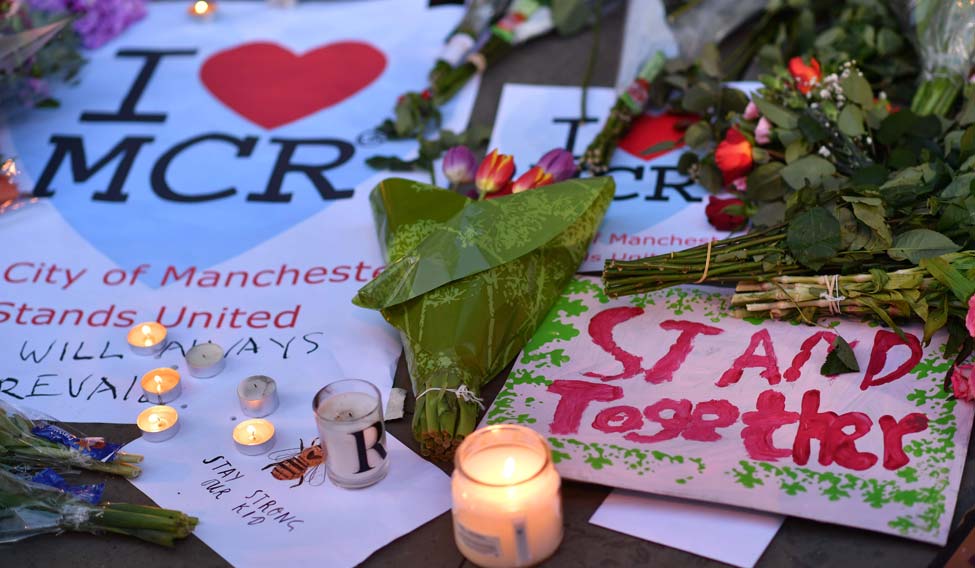The Manchester attack has been one of the worst after the 7/7 bombing, and reportedly, the biggest that North England has ever witnessed. Twenty two-year old suicide bomber Salman Ramadan Abedi, who killed 22 and injured 59—some with even life-changing injuries—was born in Manchester. His family had fled from Libya to escape Gaddafi and arrived in the UK as refugees.
Prime Minister Theresa May, Labour leader Jeremy Corbyn and others have suspended election campaign till further notice and all British political parties are standing together in solidarity, to face any odds that may come their way. London Mayor Sadiq Khan said the capital stands united with Manchester, praising heroism and bravery of the emergency services. Mayor for Greater Manchester and former MP Andy Burnham issued a moving statement claiming terrorists will "never beat us", following the attack on the arena.
However, Monday's bombing has had a few grave social consequences. Not only lives have been lost, and people are still looking for their missing families, but it also has put many important questions forward, including how Britain will cope with its local bred terrorists who are dangerous, ruthless and brainwashed by fundamentalists, and growing within the state like cancer. It also raises questions about integration of the Muslim community in the UK and the consequences they face due to a small minority's brutal actions.
On Tuesday, after the attack at the arena, members from the Ahmadiyya Muslim community were seen standing with a poster at a vigil that read, “Love for all, hatred for none” and “Promoting peace and harmony in society”. The Muslims or even in that case, anyone who is 'brown' and living in the UK, is not wrong to anticipate a backlash and fear for their safety in the current scenario.
In fact, columnist Katie Hopkins who openly tweeted a demand for a 'final solution', and Tommy Robinson's response with a series of Islamophobic tweets, which went viral, were frightening enough. Far-right groups such as Britain First have already attempted to use the attack to stir up hatred and division. And people are aware that during such delicate situations as the country faces imminent terrorism threats, it will take a small spark to spread a wild fire—especially when it comes to a communal riot.
Campaign group Stand Up To Racism rightfully called for unity and Sabby Dhalu, co-convenor of Stand Up To Racism, in a statement said: “Our thoughts are with the loved ones of those killed and those injured in Manchester. It is extremely distressing that children and young people were targeted in this way. Our response to this tragedy must be to reject the hatred of the perpetrators and those who seek to use this tragedy to divide us and for all communities to stand together. As Martin Luther King said: 'Darkness cannot drive out darkness; only light can do that. Hate cannot drive out hate, only love can do that'."
Qaisra Shahraz, co-chair of faith network Manchester, said: "As a Muslim, you fear the terrorist is a Muslim. But these attackers are monsters."
Muhammed Aslam, a resident of Greater Manchester, told THE WEEK, “What happened in the arena broke my heart. These attackers are not true Muslims. I am, in fact, afraid to send my children to school now, fearing they might get radicalised by corrupt Mullahs or bullied for being a Muslim. Though we should not fear for racial attacks, but we may still face it and we can't do anything about it.”
Local resident Bharti added, “I fear this may result into a riot. After Brexit, racial attacks have gone up slightly and racists will now try to legitimise attacks on innocent Asians. These terrorists don't realise that not only are they affecting the white community, but also tarnishing the reputation of their whole fraternity.”
The Indian High Commission in London has effectively set up a response unit and activated helplines to assist any Indian nationals caught up in the attack. In a statement on Twitter they wrote: “We will activate more helplines to be of further assistance to families and friends of those affected by the attack.”
No Asian casualties have been reported so far, but the shocked diaspora came forward to stand by the Mancunians immediately. People united in grief and carried out candlelight vigils. Traumatised families comforted each other after gathering at a support centre set up in the aftermath of the attack at the Manchester City's Etihad Stadium. Devastated locals even opened up their homes to the affected concert-goers, using the hashtag #RoomForManchester.
Sikh temples in Manchester offered shelter to those affected by the bombing. The four nearby Gurdwaras to the attack—Sri Guru Gobind Singh Gurdwara Educational and Cultural Centre, Gurdwara Sri Guru Harkrisham Sahib, Dasmesh Sikh Temple and Central Gurdwara Manchester Gurudwaras—all kept their doors open for victims through the night.
There are also reports that a hotel near the venue took in dozens of children to keep them safe. Taxi drivers, including Asians, have been offering people free rides home and volunteers were arranging to give blood at donor banks to help those injured.
Manchester's Piccadilly Gardens on Tuesday afternoon was packed with workers on their lunch break listening to a busker singing songs of defiance, including 'All You Need Is Love' by the Beatles.




